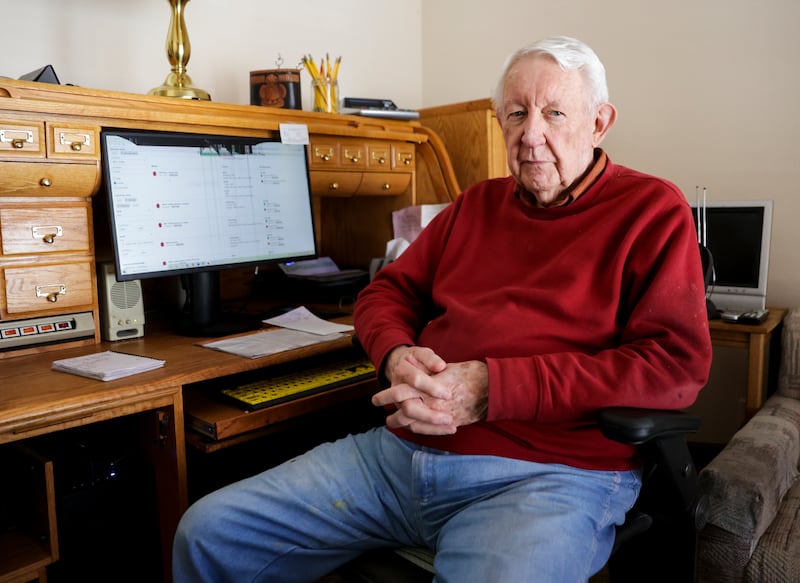Two years ago, along with the rest of the world, Dale Adams had a problem. Only his problem wasn’t just figuring out how to negotiate life around a pandemic.
He also had to figure out how to do it alone.
His kids and grandkids lived out of state. Being with friends was too risky. At 86, he was in the category called “most vulnerable.”
Before anyone knew how to spell COVID, his plan was to move out of his Park City home of 25 years and take up residence in an assisted living facility where someone else would cook his meals, repair the plumbing, provide entertainment, and be there to talk to.
Now he was going to have to stay put and fly solo.
But if one word sums up Dale Adams it would be resourceful. He is a man who knows how to adjust and move on. As an agriculture economist — he got his doctorate at Michigan State and taught at Ohio State — he traveled the world studying the plight of the rural poor and considering ways that might be lessened.
His travels took him from Colombia (where he spent three years) to Uganda to Thailand and most everywhere in between.

“I mostly attempted to improve economic systems so they made poor peoples’ lives less miserable,” is how he modestly sums up his professional career. “I’ll leave it to more objective observers to determine what, if anything, I accomplished.”
His diversion from his professorial duties was studying history. While living in Ohio, Dale — who grew up in Pleasant Grove and is a lifelong member of The Church of Jesus Christ of Latter-day Saints — liked to spend his off hours touring LDS historic sites in nearby Kirtland, Ohio, as well as Missouri, Illinois and upstate New York.
When he retired and moved to Park City in 1996, his focus became local Utah history.
“I realized even though I was born and raised in Utah, other than fishing and hunting I didn’t know that much about it,” he says. “I made up my mind to go to as many out of the way, off the road places that I could.”
By the time he reached his 80s and his travel became less energetic, Dale made a welcome discovery: through the Utah Digital Newspapers website (digitalnewspapers.org) he could sit at home and still travel the state.
The UDN program began, thanks to a government grant, in 2002. Its lofty goal is to digitize all of Utah’s newspapers, bringing online millions upon millions of pages printed in various towns large and small through the years. From its offices at the Marriott Library at the University of Utah, UDN has already digitized close to 3 million pages.
About four years ago, Dale started reading obituaries in these online pages. Not for morbid reasons, but out of a desire to keep the person in the obit alive. Their memory, at least.
He discovered he could read an obit in, for example, the Pleasant Grove Review — his hometown paper that published from 1929 to 2000 — download it to his computer and then upload it to the LDS Church Family History website (familysearch.org). By using a few key pieces of information he learned from the obituary — a birth date, a death date, a woman’s maiden name — he could find the person’s file and add the obit to the public record.
In more than a few cases he found it was the first thing that had been entered.
“It’s humbling that so many of us when we die, we don’t leave any footprints at all,” says Dale.
“It makes me feel sad that a person might live 80 or 90 years and might be a coal miner or a sheep herder and you get digging around and there are no letters, no personal remembrances at all. That’s especially true for women. Women are almost a blank slate when it comes to genealogical history.”
Well, not if Dale Adams has anything to say about it.

Before COVID-19, he’d uploaded somewhere in the neighborhood of 10,000 obits to familysearch.org.
During two years of COVID-19, he’s uploaded 20,000 more.
Not only has he vastly enlarged the genealogical record in the process, but in an unintended benefit he’s opened his locked-down house to virtual visitors.
“About once a week, sometimes more, I’ll get a telephone call,” he says. “Someone has seen that I’ve added a death notice to a relative’s file and they call to see how much else I know. They think I’m an immediate relative. I tell them that’s all I know, and the next thing you know we’ve been on the phone for an hour.
“One thing the pandemic has impressed on me is how many people, I think mostly elderly people, are just desperately lonely.”
Dale estimates he’s regularly spent two to three hours a day searching through digitized newspapers since 2020, helping in his small way to, as he puts it, “hang flesh and personality on the bones of an ancestor.”
The project has been a salvation, he says, “to the extent obituaries can be salvation.”
“You gotta find something that isn’t damaging to your health and doesn’t cost much,” he quips. “This is what I’ve done to keep from going crazy.”


